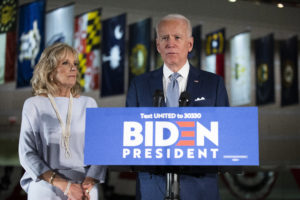Romneycare, v. 2012
The Affordable Care Act, the health reform signed into law by Obama, is now best known by the Republican label “Obamacare.” Romney hopes to ride that misleading word to the presidency.The Republican attack on Obama invokes an image of a man who is somehow not American, who is too African, too left, maybe even, God forbid, a socialist.
The half dozen men and women spending their Sunday afternoon calling potential Obama voters illustrated the challenge confronting the president: the likelihood that he will face Mitt Romney, who accuses him of wanting to “turn America into a European-style entitlement society.”
This phrase, in Romney’s speech upon winning the New Hampshire primary Tuesday, may be the centerpiece of the campaign. It encapsulates the Republican attack on Obama, invoking an image of a man who is somehow not American, who is too African, too left, maybe even, God forbid, a socialist.
The New Hampshire primary, held two days after these Obama volunteers met in California, was not especially important to them. They were focused on voters in the neighboring state of Nevada, urging them to support President Obama in the no-contest caucuses Jan. 21 and in November. California is considered in the bag for Obama, so much of the volunteer effort there is directed at Nevada. The phone work was part of the Obama campaign’s national effort to contact voters.
They met in the apartment of Max Berson, a young man who got into politics through his work in Bikeside, an organization engaged in the difficult task of making Los Angeles more bicycle-friendly. That led him to the Obama campaign, directing volunteers working their way through computerized voter lists.
He told me that during his phone calls, “I find people who are disappointed, don’t know what’s going on, or are disappointed over one issue.”
Such an issue is the Affordable Care Act, the health reform signed into law by Obama, now best known by the Republican label “Obamacare.” Romney hopes to ride that misleading word to the presidency.
“You get people who say ‘he sold us out,’ ” said Berson. He replies by giving them the details of the act, pointing out the considerable number of provisions that have already gone into effect. “If things like that don’t stand out on their radar, I don’t know what will convince them.”
Such a reaction points up the Obama administration’s consistent failure to explain the health reform law, a deficiency that was evident from the moment it was introduced. The president and his team have been amazingly tongue-tied when it comes to describing important legislation on which he expended so much political capital. That has permitted the Republicans to define the law in a derogatory way.
But as volunteer Berson noted, the Affordable Care Act has accomplished much since 2010 and will do considerably more if it survives a challenge in the Supreme Court this year. Here are some of the more significant benefits now in effect:
The coverage gap in the Medicare Part D drug benefit—enacted in 2006 during the Bush administration—is being reduced with subsidies and discounts and will eventually be eliminated. Under the gap, drug coverage ceases when the beneficiary receives a certain amount, resuming when drug expenses reach catastrophic amounts. The Associated Press quoted the Medicare office as saying someone who would have spent $1,504 in the gap period would see spending reduced to $901.
Young people up to the age of 26 are now covered on their parents’ health insurance policies.
Health plans are now required to spend at least 80 percent of their premium dollars on health care rather than on promotion and administration.
The insurance companies can no longer drop policyholders when they reach a certain benefit level, and children can’t be denied a policy because they have preexisting conditions. For adults, there are federal or state programs to provide coverage to those with preexisting conditions who have been uninsured for six months.
Small businesses are getting tax credits for setting up insurance plans for their workers. A mechanism, including an outside review, has been set up so recipients can appeal insurance company decisions. New insurance plans must cover immunization and preventive care for infants, children and adolescents. Retirees over 55 who have lost health insurance can now buy it.
There is more, compiled in detail on the Henry J. Kaiser Family Foundation website and in a shorter summary on the Extreme Liberal’s Blog.
The most important parts of the Affordable Care Act are before the Supreme Court. Its conservative majority may throw out a key part of the law taking effect in 2014. This provision would create insurance exchanges, run by a government agency or a nonprofit through which anyone—individuals or small businesses—could buy health insurance, and if the price of a policy is too great, people would be eligible for subsidies or a tax credit amounting to an average of $5,000 a year.
But to work, everyone must buy coverage from insurance companies, just as drivers are required to have auto insurance. This mandatory provision is in danger.
A better plan would have been Medicare for all, but there was no chance Congress would have passed it. Instead, Obama picked this compromise, modeled after the plan Romney signed when he was governor of Massachusetts. Maybe a better name for it would be Romneycare, not Obamacare.
In an excellent article in last month’s New England Journal of Medicine, Dr. David Blumenthal wrote that “The 2012 election will be the most important in the history of our health care system because it will determine whether the Affordable Care Act is implemented or repealed. The consequences for Americans and their health care will be huge.”
He outlined the scenarios. One is unlikely: the Democrats keeping control of the Senate while the Republicans continue to own the House. So many Democratic seats are up that it will be hard for the party to hold on to its three-vote Senate majority. Another is Republicans controlling the Senate, the House and the White House, where Romney has pledged to put health care repeal at the top of his agenda. Finally, Obama could retain the presidency and block efforts to destroy the Affordable Care Act. If the act remains law, insurance would be extended to more than 30 million people.
The Supreme Court could damage the law by wiping out the individual mandate. But even so, Blumenthal said, “the administration could push forward with many other provisions,” including establishment of exchanges, expansion of Medicaid for the poor, federal subsidies for purchase of insurance, penalties for employers not providing coverage, and provisions to improve the efficiency and quality of medical care.
If Romney or someone like him is elected, all this would be eliminated. Instead of following the example of nations around the world with decent health care, including those in Europe scorned by Romney, we would be doomed to continue our unfair, inferior health system.
Your support matters…Independent journalism is under threat and overshadowed by heavily funded mainstream media.
You can help level the playing field. Become a member.
Your tax-deductible contribution keeps us digging beneath the headlines to give you thought-provoking, investigative reporting and analysis that unearths what's really happening- without compromise.
Give today to support our courageous, independent journalists.






You need to be a supporter to comment.
There are currently no responses to this article.
Be the first to respond.